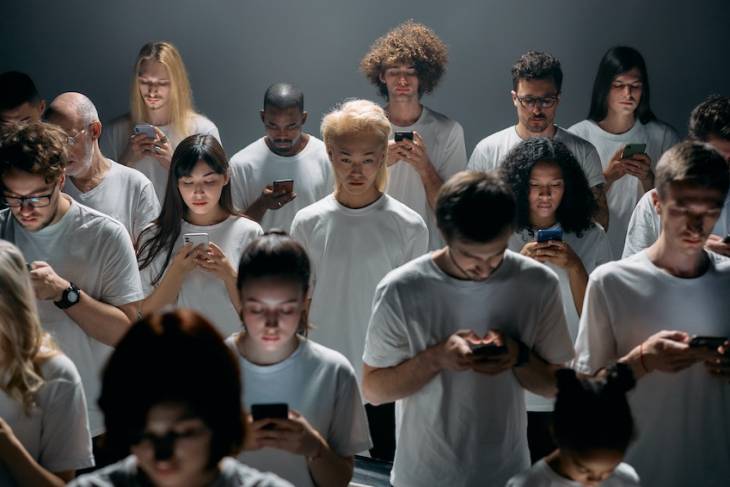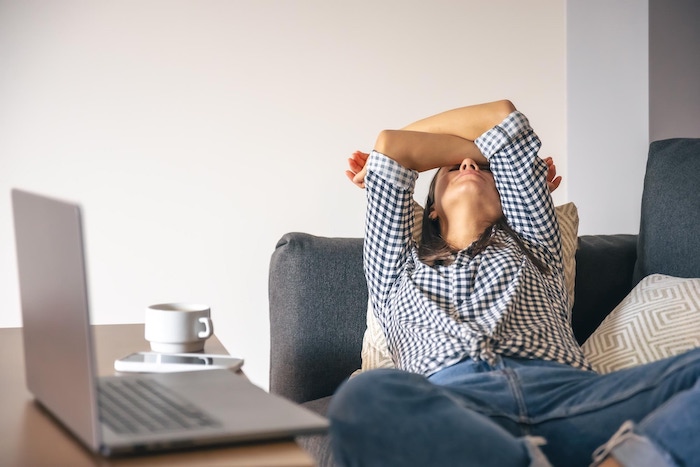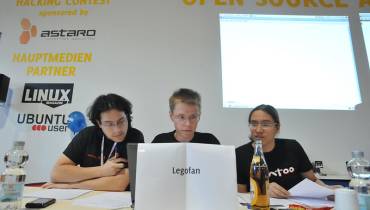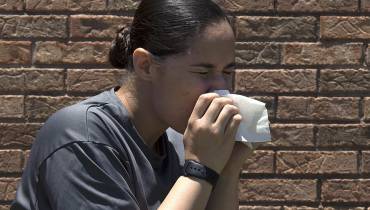How Technology Is Impacting Our Physical and Psychological Wellbeing

Our daily lives have become increasingly reliant on technology – we rely on our laptops, cellphones, PCs, and tablets to provide instant access to information and other resources. These tech tools help us at home, at work, and on the go, allowing us to communicate with loved ones and stay engaged for hours.
However, many people are starting to lament and share their negative experiences with technology, saying it has made their life more difficult in some critical ways. Even though technology is meant to make life easy, it has also become a major contributor to serious mental health issues.
Is technology to blame? Or are we humans to blame because we are using it improperly or in excess?
Excessive use of technology can leave one feeling drained and affect your physical and mental health. The recent global pandemic showed that the exacerbated use of technology when we couldn’t go out to distract oneself causes a “digital overload” of sorts that brought about spikes in cases of depression and anxiety.
This technological and digital overload age has affected everyone and is impacting our lives in unexpected ways.
Ways Technology Increases Mental Health Issues
Even though we emerging out of a deadly pandemic that forced us to greatly turn to and rely on technology, humans are still continuing to rely on technology more than ever before. There are millions of videos and images posted daily and workers are still busy working on their devices far more than ever.
We have not stopped or slowed down on the use of and reliance on technology even though we now have the freedom to unplug and go outside. Not surprising, people are experiencing “technology burnout” and are struggling with mental issues now more than ever before.
Mental illness is linked to the use of technology in some ways. Anxiety, for example is the natural response (fight or flight) of our body to situations where we encounter dangers. In today’s society, we have mostly removed physical dangers that cause these natural fight or flight responses.
However, technology (a modern trigger of fight or flight responses) has taken hold and now plays the role of primal dangers that used to cause anxiety to our human ancestors. Our fight or flight response which happens naturally is now really out of line as it now perceives most things as threats or a trigger.
People who are diagnosed with anxiety have recurring thoughts (many of which are brought about or facilitated by modern technology, like social media and smartphones) which cause them to dread certain situations and persons that trigger them into anxiety episodes.
These anxiety attacks and episodes can be severe and greatly interfere with people’s daily function, with some physical and psychological effects of technology over-use and dependence being very grave.
Psychological Effects of Technology
Excessive use and reliance on technology can negatively affect the psychological state of a person. The negative psychological impact and changes can be subtle but end up building up and affecting one’s life in various ways, including triggering feelings of isolation and depression.
I. Build Up feelings of Isolation
Instead of feeling connected, some people who spend a lot of time with technology and online begin to feel isolated. They do not participate in offline activities, so they forget to meet up with family and friends in the real world.
Some can get caught up with the made-up world that social media has created that is often far removed from the real world. This ultimately makes people feel more alone and plagued by the fear of missing out.
II. Triger Feelings of Joy or Anxiety
The psychological effect of technology is not a one-sided affair. Different factors can contribute to how one feels and experiences technology. For example, in a systematic study conducted in 2016, researchers found that not everyone has a negative experience with social media.
In fact, when a person encounters positive interactions on social media, they tend to have lower levels of anxiety and depression, and actually feel happy. On the other hand, those who have a negative experience on social media get stressed and have higher levels of depression and anxiety.
Physical Health Issues of Technology
Aside from influencing an individual’s mental and psychological state, technology also has physical effects too.
I. Eyestrain
Staring at the bright screen of your tech device for a long period can lead to eyestrain. An individual with such a problem has blurry vision, dry eyes, not to mention pain in the neck, shoulder, and head from sitting or standing too long working on their tech devices.
You should always strive to take some break away from the bright screen for your physical wellbeing.
II. Affects Posture
Poor posture can cause issues with your musculoskeletal system, which includes your bones, cartilage, ligaments, tendons, and connective tissues. Using mobile devices too much, for example, can lead to a bad down-and-forward posture, stance for the users.
People who constantly spend time on their devices tend to hunch forward and look down. This position adds pressure to a person’s neck and spine. By properly positioning yourself and limiting the use of devices, you can prevent hurting your back.
III. Sleeping Problems
The blue light from our devices can disturb the normal circadian rhythms that follow a 24-hour cycle within our bodies. These natural circadian rhythms and processes respond primarily to light and dark and affect most living things, including animals, plants, and microbes.
Use of tech devices, particularly at night, can thus affects our sleeping patterns, making it difficult to fall asleep and leading to feeling tired and not well-rested the next day.
IV. Less Physical Activity
Excessive use of technology can also lead to a sedentary lifestyle that’s characterized by a person sitting or lying all day long every waking day with their tech tools.
A sedentary lifestyle is very bad for your overall health and wellbeing and will contribute to a wide array of health issues brought by inactivity such as:
- Obesity
- Heart problems
- Type 2 diabetes
Cut back on the use of technology, go outside, engage in some physical activities, and exercise regularly to experience a well-balanced, active lifestyle for a healthier life.
Signs You May Be Suffering from Technology Overload/Burnout

Sometimes we manifest all the symptoms of technology overload and burnout and we do not realize it. It's important to pay attention so that you know when you have the symptoms of technology overload and when you need to seek help for any physical and mental issues arising from it.
Some common signs and symptoms that you may be suffering from technology overload and burnout include:
- Spending too much time on your tech tools/device(s) without taking regular breaks from them.
- Getting too much information from different digital sources makes you feel exhausted and overwhelmed.
- Multitasking with tech tools and digital media. As you consume loads of digital information, for example, you are more likely to use multiple devices at once. People who multitask with their devices can become exhausted, overwhelmed and find it difficult to focus on any single activity.
- Excessive mood swings and feelings of hopelessness, despite spending most of your time online or using tech.
- Not spending time connecting offline with family and friends.
When Technological Use Is Considered Too Much
While there are no exact hours as to when one can consider the use of technology too much, in some studies, adolescents who spend two hours on their screen report symptoms of anxiety and depression,
Other studies find that adults who spend more than 4 hours per day of screen time are categorized as high screen time/tech users, while the inverse is true.
Meanwhile, those adults who spend about 11 hours on any device every day are more prone to having anxiety, depression, and other physical maladies. Some of these people, however, spend time on their devices due to their work, which may be unavoidable.
Generally, though, more hours of screen time are associated with lower well-being. But of course, technology isn’t all bad. It has also provided better solutions and options for everyone to boost their lives and wellbeing. We cannot take away the fact that technology has also improved our lives in many ways.
Positive Effects of Technology
First, technology has made mental health therapy accessible via the internet and apps. You can consult a licensed therapist online from the comfort of your home or even on the road.
Some apps and websites are great for mental health services and they are available for free. Others require a small payment fee but are highly effective nonetheless.
Technology has opened more job opportunities online, even amidst the loss of traditional offline jobs. People have found ways to sustain themselves and earn a living by starting and running their business online. This brings a lot of convenience, financial freedom, and peace of mind to people.
Technology has also empowered us with the ability to build better, more seamless communication channels, grow our businesses, engage and collaborate with each other no matter where we are located in the world. During the pandemic, technology even made it possible for people to connect while practicing social distancing.
The over-use of and dependence on technology is what can bring issues. Fortunately, there are ways you can prevent technology affecting your mental and physical health.
Tips to Manage Your Use of Technology
You can avoid getting tired, anxious, stressed, hopeless, or depressed when using technology if you limit your use of it and strive to live a more balanced lifestyle. Here’s how you can do that:
- Set a specific time for using tech each day to reduce your screen time. You can use your wall clock or an app to set time. For the rest of the time, unplug from tech and walk away to do other things.
- Limit yourself to using one device at a time. For example, you can use your laptop for work. Instead of turning to your smartphone after working on your laptop, read a book or do a chore instead.
- Turn off notifications on your devices to avoid distractions.
- Plan offline activities so you can reduce the time you spend on social media and other online sites.
- Shut off and set aside technology devices an hour or two before your bedtime.
- Designate time/places in your home or workplace where technology and devices are off-limits, such as the dinner table to give your full attention, spend quality time with your family and other people.
- Resist the urge to check on your social media accounts every other minute.
- Take some time off your devices and go outside for exercise and fresh air.
In Conclusion
Addmitedly, technology has greatly improved our lives and the way we manage business and other affairs. However, it can also contribute to mental and physical health issues if not used properly.
Our habits as it relates to technology and the digital world need to improve to guard against the negative implications of technology overuse and burnout. With discipline and awareness, we can foster a good relationship with technology, and make our lives truly better, healthy, and positive.
Building healthy technology habits is critical to our physical and psychological wellbeing.






















